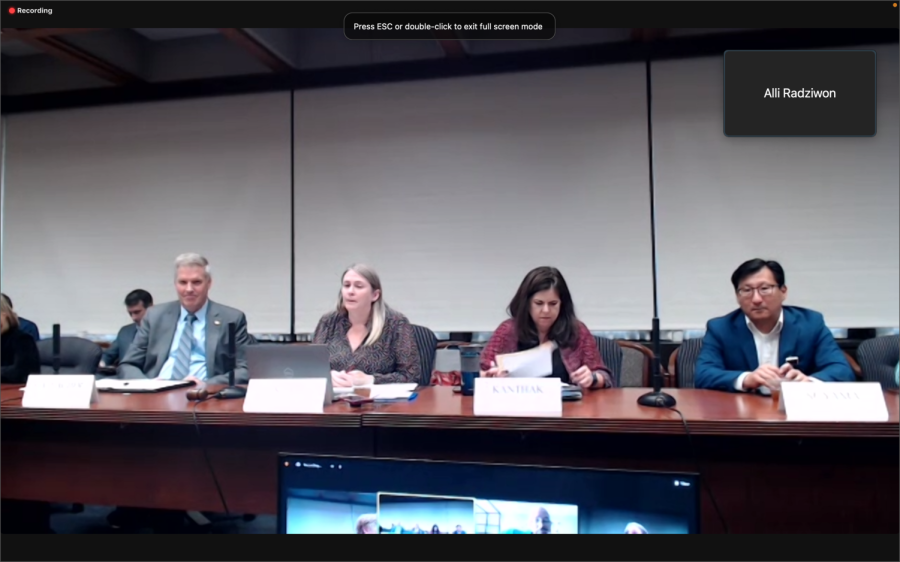Senate Council talks COVID-19 expectations, reproductive health resources for students
From left, Patrick Gallagher, Robin Kear, Kristin Kanthak and Joe Suyama at Thursday’s Senate Council meeting.
September 16, 2022
At the monthly Senate Council meeting, director of the Covid Medical Response Office Joe Suyama said there’s “no better place” for students to learn than in the classroom. Because of this, he said it’s important to take “personal responsibility” and for students to know when they’re sick and to stay home to avoid spreading illnesses like COVID-19 to others.
Suyama also said the Backyard Brawl didn’t cause a spike in COVID-19 cases, despite being the highest attended sports event ever at Acrisure Stadium.
“Personal responsibility, although it sounds fairly mundane, it’s actually very difficult to sort of normalize in regards to human behavior,” Suyama said. “Personal responsibility means that if we aren’t seeing those bumps, you guys are doing a good job. And I think that’s an accolade to the University, to the faculty and staff as well as the students in particular.”
Pitt’s Senate Council held its monthly meeting on Thursday afternoon both in person at room 2700 of Posvar Hall and on Zoom. The council discussed COVID-19 expectations and reproductive health resources for students for the new academic year.
Suyama said personal responsibility is especially important for first-year students, as they are “brand new” to the University and its expectations.
“Your personal responsibility means you need to know the risks. Know when to wear the mask, know when to get tested, know when to get boosted, know when to stay at home, know when to do the things that protect others as well as you, and I think that’s where we’re getting to,” Suyama said. “But our new colleagues — the first year class — need a little bit of a running start. Maybe their parents need a little bit of a running start as well. There’s a lot of challenges from that perspective.”
President Robin Kear emphasized what she said at last week’s Faculty Assembly meeting — saying faculty should “set clear expectations” for students on missed class and work for COVID-19 and other illnesses. She said it’s important to emphasize in-person learning.
“I think it’s important for faculty to be able to have set out clear expectations thinking about missing students missing the work for COVID just as they would have missed work in classes for, you know, breaking a leg or having another illness, right, so just setting clear expectations as we move back into focusing on in-person learning,” Kear said. “So just to be compassionate in that area.”
According to Suyama, there are currently about 137 COVID-19 cases “actively being monitored.” He said students should get their COVID-19 booster as soon as possible.
When asked why Pitt reduced isolation housing capacity to 25 beds, Suyama said the CMRO is looking at the situation from “a housing perspective.”
“We are looking at what the right size of isolation capacity is in regards to students that need to be fully isolated outside of their current situation,” Suyama said. “We are actively looking at what is the best and the most and the right capacity size.”
Kear said she met with student leaders and the Student Government Board in August concerning reproductive rights and support for students after the overturning of Roe vs. Wade in June. Kear also said she signed off on a letter coauthored by SGB and the Cultural Studies Governing Board. Student Affairs emphasized opportunities for students to receive mental and emotional care, as well as wellness and reproductive health resources, according to Kear.
“If you’re interested in these issues, I recommend following a center called the Center for Innovative Research on Gender Health Equality, also known as Converge at Pitt,” Kear said. “They’re also holding several fall events around reproductive rights and health care … and there are also related events in the Humanities Center.”
Danielle Floyd, president of SGB, said she would like to continue speaking with Student Affairs about reproductive rights for students. The letter, signed by Kear, became publicly available on Sept. 13 on the SGB website. The letter includes actions for the University, such as a public statement about the consequences of overturning Roe vs. Wade and a resource guide for students.
“And we’re hoping to follow up with … some of the civic action items in the letter,” Floyd said.
At Thursday’s meeting, Chancellor Patrick Gallagher also congratulated new deans for various schools within Pitt – including Amy Seybert of the School of Pharmacy and Eugene Anderson of Joseph M. Katz Graduate School of Business and College of Business Administration.
“I just want to thank all of those — congratulate all those individuals for taking on these roles but I want to thank again, the committee’s and everybody else’s support on these processes,” Gallagher said. “It’s really a team effort. And I am always pleased with how deliberate and careful we are in that search process.”








